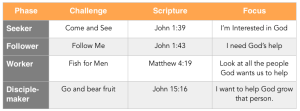Discipleship
The Why
1 John 2:6 says, “you ought to walk as Jesus walked.” We take this command in John’s first epistle quite seriously. Jesus was God, but he was also a man who had to learn and grow in his own understanding of who he was and who God was. He is our primary example on how we ought to live. Surely, we will never achieve the perfection that he embodied. But that does not mean we are not to strive to adjust our lives to reflect his through the power of the Holy Spirit.
We are taking measures to focus our church on not only growing wider in numbers but deeper in faith. We do this by modeling our ministry after Jesus’ 3 1/2 year ministry here on earth.
The What
 Jesus challenged his disciples through four stages of development. First his disciples were seekers. They were interested in learning more about who this Jesus was. Examples of the seeker are Nicodemus, Andrew and John, Philip and Nathaniel, Zacchaeus, The Rich Young Ruler, and many more. These men answered the call of “come and see” what exactly this is all about. But some never progressed beyond that.
Jesus challenged his disciples through four stages of development. First his disciples were seekers. They were interested in learning more about who this Jesus was. Examples of the seeker are Nicodemus, Andrew and John, Philip and Nathaniel, Zacchaeus, The Rich Young Ruler, and many more. These men answered the call of “come and see” what exactly this is all about. But some never progressed beyond that.
Shortly after his call to “come and see,” Jesus called his primary Disciples to a higher level of commitment through the challenge of “Follow Me.” Many answered this call to become followers. These are new converts to Christianity who are stumbling around looking for assistance in figuring out this new life in Christ.
Around 18 months into his ministry, Jesus begins to teach his disciples how to reach seekers by going on mission trips all around the Sea of Galilee and Judea. He calls his disciples to “follow Me and I will teach you how to catch people.” Now, they are dedicated each day to the work of Christ concerned with the masses and reaching the lost.
On the eve of his suffering, Jesus makes his final challenge. He says, “Go and Bear Fruit.” He is telling his disciples to go and do what he has done with them, meaning to go and make new disciples who can make disciples. He challenges them to be disciple-makers.
This is the goal of Adult Discipleship at New Lisbon, to make disciples who can make disciples. All believers are charged with the great mission to “Make disciples of all nations,” this job is not meant for just a few.
The How
Therefore, our Disciple-making strategy at NLCC is to:
Seek – Follow – Work – Make Disciples
And to help everyone wherever they may be in their journey to become a disciple-maker. In order to do this, we offer various types of groups to create an environment where this process can naturally take place. This is achieved in our Groups Ministry. You can learn more by following the link.
If you would like to learn more on how to be a disciple who makes disciple or would like to be paired up with a disciple maker, we can get you connected to a Transformation Group.